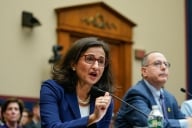You have /5 articles left.
Sign up for a free account or log in.
My kids have 6 grandparents. This is an extraordinary embarrassment of riches when it comes grandmothers and grandfathers. Many grandparents are just one of the upsides of our modern methods of blended family formation coupled with longer lifespans.
These grandparents - me and my wife’s parents - range in age from mid-sixties to mid-seventies. Thankfully, all 6 of these amazing people are today relatively healthy.
The reason that I’m telling you about my parents is that aging parents is a subject that anyone looking to navigate a higher ed career - or any career - needs to discuss.
This week we had a great discussion about the challenges that the parents of school-age children often have in managing work responsibilities, especially when those responsibilities are irregular and stretch into early mornings and evenings. A number of folks pointed out in the comments that the challenges of balancing work and family commitments are not restricted to those with school-age children.
Over the years I’ve watched many of my colleagues struggle to navigate their own demanding higher ed careers and the care of aging parents.
From what I have observed, the demands of being there for parents during times of acute or chronic illness are exponentially more difficult than the “normal” demands of caring for school-age children.
The challenges of caring for parents while juggling careers are many.
Few of us live in the same city, or even state, as our parents. Those who work in higher education may be even less likely to live close to parents, as most of us had to go wherever the jobs were available. (Or follow our partners to that job).
Making sure that an elderly parent has what they need in terms of healthcare and in-home assistance is difficult to do over the phone. Everyone I know who managed a parental health crisis had to travel to do so.
For aging and ill parents, there seems to be very little in the way of systemic support structures. School-age kids can be in school. After-school programs exist. My kids went to public schools from the start, paid for by property tax dollars of everyone in town (including those without kids in the school system).
For aging parents who become ill, there is very little in the way of established support structures outside of the family. Spouses take care of spouses. Kids take care of moms and dads.
This year I’ll turn 48. By my calculations, I have at least 20 years left in my higher ed career. Hopefully longer. These next 20 years should be my most productive. After two plus decades of working in higher education, I have learned a few things. My kids have left the nest.
I also expect that the next two decades will be a time when I also will need to be there for my parents. What life will look like managing an intense, exhilarating, and demanding higher ed career - while at the same time being present for six aging parents - is a future that I can only guess about.
What I do know is that almost all of us will, at one point or another, need to be present for our family members as they age and get sick.
We need to do a much better job across higher education in talking about how we might all support each other in navigating all of our work and family commitments.
What has been your experience of taking care of your parents, or other aging or ill family members, while juggling your higher ed career?
Can you offer any advice for those of us at the cusp of this new phase of work / family balance?








